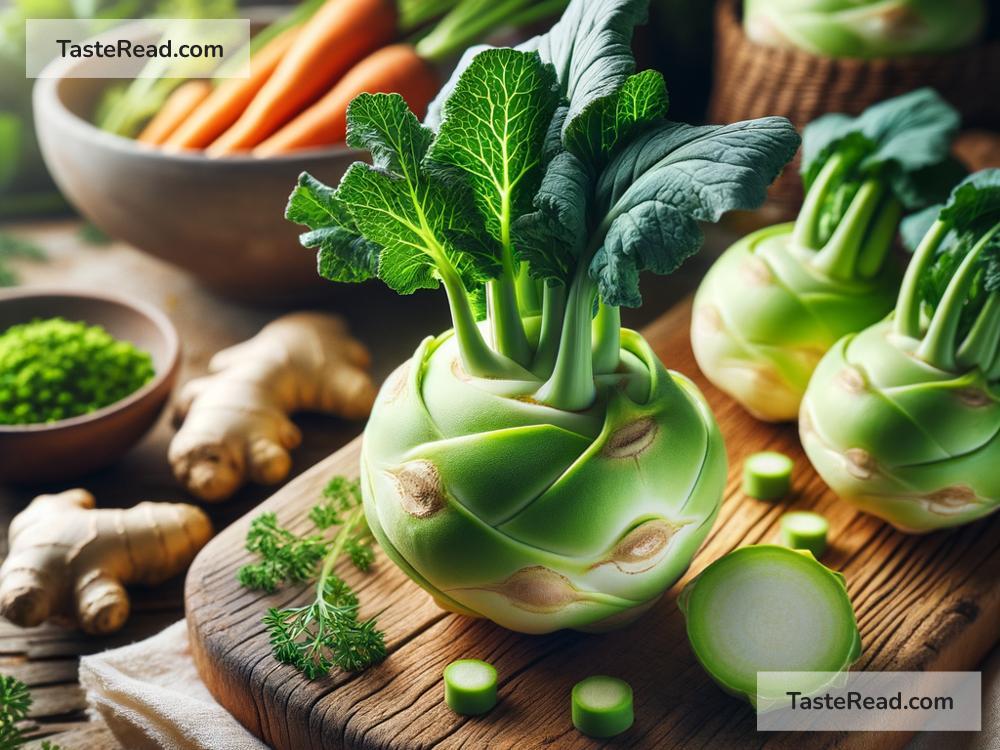The Benefits of Kohlrabi for Boosting Immunity During Flu Season
Flu season is here, and many people are looking for ways to stay healthy and keep their immune systems strong. While eating fruits and vegetables is always a good idea, there’s one often-overlooked veggie that deserves some extra attention: kohlrabi. This odd-looking vegetable might not be as popular as kale or broccoli, but it’s packed with nutrients that can help boost immunity and keep you feeling great during flu season. Let’s explore why kohlrabi is a superstar for your health and how you can easily add it to your diet.
What Is Kohlrabi?
Kohlrabi is a member of the cabbage family, along with broccoli, cauliflower, and Brussels sprouts. Its name comes from the German words “kohl,” meaning cabbage, and “rabi,” meaning turnip. This vegetable looks like a round bulb with leafy stems sticking out, and it comes in green or purple varieties. While the bulb is the most commonly eaten part, the leaves are also edible and packed with nutrients.
If you’ve never tried kohlrabi before, you’re in for a treat. Its flavor is mild, slightly sweet, and similar to broccoli stems or a crisp apple. It’s versatile and can be eaten raw, roasted, steamed, or added to soups and salads.
Why Kohlrabi Is Good for Your Immune System
During flu season, your immune system is your best defense against illnesses like colds and the flu. Kohlrabi is loaded with vitamins, minerals, and antioxidants that support immunity and overall health. Let’s break down its key benefits:
1. Rich in Vitamin C
One of the most important nutrients for your immune system is vitamin C, and kohlrabi has it in abundance. In fact, just one cup of kohlrabi contains more than 100% of your daily recommended intake of vitamin C. This vitamin helps protect your cells from damage, fights infections, and speeds up your recovery if you do get sick. Eating kohlrabi regularly can give your immune system the boost it needs to stay strong all season long.
2. Antioxidant Power
Kohlrabi is also rich in antioxidants, which are compounds that help protect your body from harmful free radicals. Free radicals can damage your cells and make you more vulnerable to illnesses. The antioxidants in kohlrabi, including vitamin C, polyphenols, and carotenoids, work together to fight off these harmful molecules and keep your immune system functioning at its best.
3. High in Fiber
A healthy gut plays a big role in supporting your immune system, and kohlrabi’s fiber content can help. Fiber promotes the growth of good bacteria in your gut, which help regulate your immune response. A well-balanced gut microbiome can reduce inflammation and make it easier for your body to fight off infections during the flu season.
4. Full of Immune-Boosting Phytochemicals
Phytochemicals are natural compounds found in plants that can help protect your body from disease. Kohlrabi contains glucosinolates, which are known for their immune-boosting and anti-inflammatory properties. These compounds may help your body fight off viruses and bacteria, giving you an extra layer of protection during flu season.
5. Packed with Essential Vitamins and Minerals
Besides vitamin C, kohlrabi contains other essential nutrients like potassium, magnesium, and vitamin B6. Potassium helps regulate your blood pressure, magnesium supports muscle function, and vitamin B6 plays a key role in producing antibodies that fight infections. These nutrients all work together to keep your body healthy and resilient.
How to Add Kohlrabi to Your Diet
Adding kohlrabi to your meals is easy and delicious. Here are some simple ways to enjoy this nutritious veggie:
- Raw: Peel the bulb and cut it into sticks or thin slices. Eat it as a crunchy snack or add it to salads for extra texture and flavor.
- Roasted: Toss kohlrabi cubes with olive oil, salt, and pepper, then roast them in the oven until they’re golden and tender.
- Mashed: Steam and mash kohlrabi for a healthy alternative to mashed potatoes.
- Soup: Use kohlrabi in soups or stews for added nutrition and a mild, sweet flavor.
- Stir-Fries: Slice kohlrabi thinly and toss it into stir-fries with other vegetables and your favorite protein.
- Pickled: Make crunchy kohlrabi pickles to enjoy with sandwiches or as a snack.
If you’re new to kohlrabi, it’s best to start small and experiment with different ways to cook and enjoy it.
Final Thoughts
Kohlrabi may not be the most famous vegetable, but it’s definitely one worth adding to your diet—especially during flu season. Its impressive nutrient profile, including high levels of vitamin C, antioxidants, fiber, and phytochemicals, makes it a powerful ally for keeping your immune system strong and your body healthy. Plus, it’s versatile and easy to prepare, so you’ll never get bored of eating it.
So, the next time you’re at the grocery store or farmer’s market, pick up a few kohlrabi bulbs and give them a try. Your immune system will thank you, and you may just discover your new favorite vegetable.


